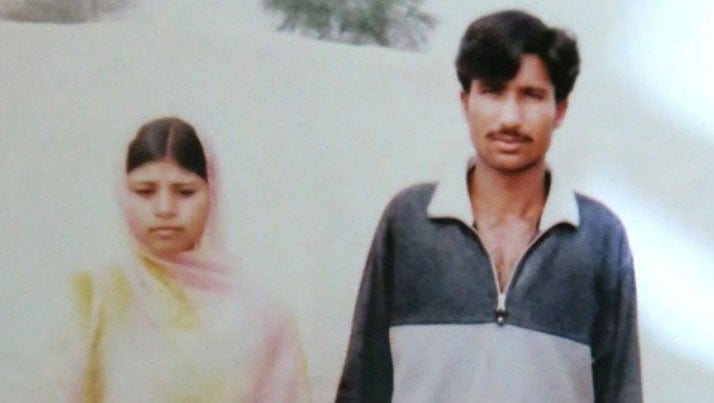
Shama and Shehzad’s children have yet to recover from the trauma as 20 more accused of lynching their parents have been set free

Suleman, Sonia and Poonam were all dressed up for Easter last Sunday. For four years they’ve been celebrating Easter without their parents, Shama and Shehzad who they miss but don’t talk about. Shama and Shehzad were lynched and burnt alive in a brick kiln in Kot Radha Kishan near Kasur in 2014 after being "accused" of blasphemy.
Just before Easter, on March 22, the court released 20 people held on charges of lynching Shama and Shehzad, for lack of evidence. Two years back, in April 2016 the Anti-Terrorism Court granted bail to the lead suspect, Yousaf Gujjar for the same reason.
Suleman who was six years old then and worked at the kiln, saw the whole episode. Apparently quiet, his body language speaks of aggression and sadness. Sonia was 4 years old then. For over a year Sonia was in a state of shock. Her only words were "Mama papa nu saarh ditta" (mother and father were burnt). With the help of caring people she has apparently come out of the shock; she speaks to people now but some questions linger in her eyes.
The couple’s other son was adopted by Shehzad’s brother. The youngest child Poonam was in Shama’s arms when she was snatched away before the couple were thrown into the kiln. Poonam is too young to know what happened but lack of mother’s love is quite visible on her face.
Like previous years Cecil and Iris Chaudhry Foundation (CICF) celebrated Easter with the children. "The Foundation is providing them free education and other facilities to make life easy for them, despite this their lives are not normal," President CICF Michelle Chaudhry tells TNS, adding, "There is some improvement, still they are not back to life. While they are showing better results at school, their personalities are not developing and they are still in a shell."
The state has not been able to develop a facility to provide help to trauma victims. This area demands urgent attention of the state. Fatima Ali Haider, a survivor of sectarian violence and co-founder of The Grief Directory (TGD) says, "There is need for centres to address both physical and emotional trauma. TGD has been advocating a one window operation for such families as the sufferers have a variety of needs. These trauma centres can be set up in government or private sector to facilitate not only those who suffer from violence but the general public as well."
After the incident a number of people approached the family to adopt all three children but Mukhtar Masih, Shama’s father refused. He had his own reasons but it can be seen that the children need to get out of this environment to recover fully, or they remain at risk and will not recuperate from the trauma. Talking to TNS, Mukhtar said, "While the government has given them enough money to look after the children, all they want is justice."
The Punjab Government gave Rs5.5 million and 10 acres of land for the children. The grandparents get Rs5000 per child every month. This does help raise the children yet timely action by the Police may have averted the killing.
Shehbaz Masih, elder brother of Shehzad, is fighting a legal battle in court, seeking justice for his slain brother. Shehbaz was a Jamadar (supervisor) at the same brick kiln. In November 2014 during Moharram a frenzied mob lynched and burnt Shama and Shehzad in a brick kiln accusing them of blasphemy. The two had been workers at the kiln for over 15 years.
In 2015, the ATC had indicted 106 suspects in the lynching case. By November 2016, 90 of them had been acquitted including the owner of the brick kiln who locked the couple up to prevent them from escaping. The court sentenced to death five people who dragged the couple and threw them into the kiln and awarded eight people two years’ imprisonment each for involvement in the lynching.
According to a recent report released by Center for Social Justice, a non-government organisation, "Almost 74 per cent cases of blasphemy are from Punjab."
Talking to TNS, Shehbaz Masih’s lawyer Kashif Alexander, Advocate High Court said, "Minorities are not the only ones accused of blasphemy. Some Muslims have been falsely accused of blasphemy too. A woman accused her husband of it -- actually there was a property dispute. Majority of cases are property or money related."
An important point that Advocate Alexander raised was that hate speech was not made part of Shama Shehzad’s case. The clerics of Kot Radha Kishan played a vital role in inciting the mob but the state did not take this into account. Under the National Action Plan, the National Counter Terrorism Authority (NACTA) report 2017 puts arrests of alleged hate-mongers at 6,855.
What is unfortunate is that the police does not handle such situations well. Such cases are enough to show that action is needed to modify the law to include punishment to those who falsely accuse people and put their lives in danger.
So long as measures are not taken to ensure full investigation into such cases, minorities in Pakistan will continue to live under the shadow of a Damocles sword.